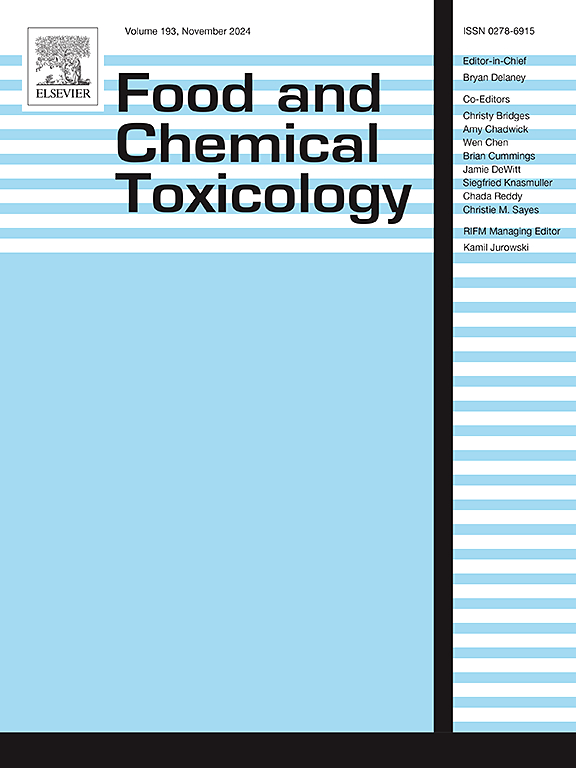三邻甲酰磷酸通过诱导氧化应激引起小鼠葡萄糖耐受不良和胰岛素抵抗
IF 3.5
3区 医学
Q2 FOOD SCIENCE & TECHNOLOGY
引用次数: 0
摘要
作为一种典型的有机磷化合物,三邻甲酰磷酸(TOCP)作为工业添加剂得到了广泛的应用。但TOCP在维持葡萄糖稳态中的毒性尚未完全阐明。本研究通过动物模型和细胞实验研究了TOCP在葡萄糖稳态中的作用机制。亚慢性暴露于TOCP引起ICR小鼠血液中快速葡萄糖水平升高和胰岛素抵抗。此外,我们发现TOCP治疗后肝脏出现明显的氧化应激和葡萄糖转运蛋白下调。胰腺可见代偿性胰β细胞增生。值得注意的是,抗氧化维生素C共处理能够改善体内肝脏的葡萄糖代谢紊乱并减少氧化应激。在HepG-2细胞中,TOCP代谢物CBDP暴露导致胰岛素刺激的葡萄糖摄取减少,葡萄糖转运蛋白基因下调,活性氧积累。Vc共处理逆转了这些现象。本研究表明,有机磷暴露可通过诱导氧化应激引发胰岛素抵抗和葡萄糖耐受不良,这为有机磷化合物的代谢毒性及其潜在的治疗方法提供了新的认识。本文章由计算机程序翻译,如有差异,请以英文原文为准。
Tri-ortho-cresyl phosphate causes glucose intolerance and insulin resistance in mice by inducing oxidative stress
As a typical organophosphorus compound, tri-ortho-cresyl phosphate (TOCP) has been widely used as an industrial additive. But the toxicity of TOCP in the maintenance of glucose homeostasis has not been fully elucidated. In this study, the mechanism of TOCP's effect in glucose homeostasis was investigated using both animal models and cellular experiments. Subchronic exposure to TOCP in ICR mice caused increase of fast glucose level in blood and insulin resistance. In addition, we found significant oxidative stress and downregulation of glucose transporter in liver after TOCP treatment. In pancreas, compensatory pancreatic β-cell hyperplasia was observed. Notably, antioxidant vitamin C cotreatment was able to ameliorate glucose metabolism disorders and reduce oxidative stress in liver in vivo. In the HepG-2 cells, TOCP metabolite CBDP exposure caused decrease of glucose uptake stimulated by insulin, downregulation of glucose transporter gene and accumulation of reactive oxygen species. Vc cotreatment reversed these phenomena. This study demonstrates that organophosphorus exposure can trigger insulin resistance and glucose intolerance through induction of oxidative stress, which provides new insights in the organophosphorus compounds' metabolic toxicity and potential treatment of this toxicity.
求助全文
通过发布文献求助,成功后即可免费获取论文全文。
去求助
来源期刊

Food and Chemical Toxicology
工程技术-毒理学
CiteScore
10.90
自引率
4.70%
发文量
651
审稿时长
31 days
期刊介绍:
Food and Chemical Toxicology (FCT), an internationally renowned journal, that publishes original research articles and reviews on toxic effects, in animals and humans, of natural or synthetic chemicals occurring in the human environment with particular emphasis on food, drugs, and chemicals, including agricultural and industrial safety, and consumer product safety. Areas such as safety evaluation of novel foods and ingredients, biotechnologically-derived products, and nanomaterials are included in the scope of the journal. FCT also encourages submission of papers on inter-relationships between nutrition and toxicology and on in vitro techniques, particularly those fostering the 3 Rs.
The principal aim of the journal is to publish high impact, scholarly work and to serve as a multidisciplinary forum for research in toxicology. Papers submitted will be judged on the basis of scientific originality and contribution to the field, quality and subject matter. Studies should address at least one of the following:
-Adverse physiological/biochemical, or pathological changes induced by specific defined substances
-New techniques for assessing potential toxicity, including molecular biology
-Mechanisms underlying toxic phenomena
-Toxicological examinations of specific chemicals or consumer products, both those showing adverse effects and those demonstrating safety, that meet current standards of scientific acceptability.
Authors must clearly and briefly identify what novel toxic effect (s) or toxic mechanism (s) of the chemical are being reported and what their significance is in the abstract. Furthermore, sufficient doses should be included in order to provide information on NOAEL/LOAEL values.
 求助内容:
求助内容: 应助结果提醒方式:
应助结果提醒方式:


